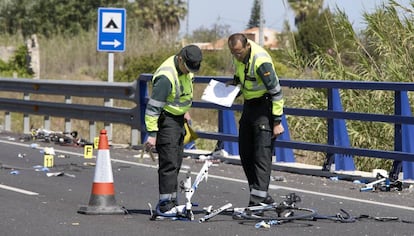More than 400 cyclists killed on Spain’s roads in 10 years
Increasing numbers of people are turning to two-wheeled transportation, but infrastructure is inadequate
The number of accidents on Spain’s non-urban roads involving cyclists doubled between 2009 and 2015: from 1,082 to 2,013. What’s more, the trend is reflected within cities, where over the same period the number of accidents grew from 2,387 to 5,173. At the same time, the number of people taken to hospital after a road accident involving bicycles rose from 489 in 2009 to 652 in 2015, a 33% increase.

Taking into account the year 2016 and the figures so far this year, the DGT says more than 400 cyclists have been killed on Spain’s roads since 2008. The latest victims joined the statistics on Sunday morning, when a drunk driver in Valencia ran into a group of six cyclists, killing two on the spot and seriously injuring three more. One of the latter died of his injuries four days later.
We need to be cautious and not spread alarm. It is less dangerous to use a bike than 10 years ago Manuel Martín, ConBici
The surge is due in large part to greater numbers than ever of cyclists on Spain’s roads, says Luis Montoro, Professor of Road Safety at the University of Valencia. “But in the face of this trend, we come up against a lack of strategies and institutional measures,” he warns. Among these is a lack of infrastructure: “particularly on main roads,” and not enough road safety awareness campaigns in the media. A survey run by insurance company Axa and bike safety watchdog Ponle Freno showed that 30% of cyclists admit to not knowing the rules of the road, and this in a country where more than a million bikes are now being sold each year, according to the sector’s association.
“We need to be cautious and not spread alarm. At present, it is less dangerous to use a bike than it was 10 years ago,” says Manuel Martín, technical director of ConBici, a nationwide cyclists’ organization, adding that the number of cyclists killed on Spain’s roads has remained stable, despite the bike boom of the last decade.
“Any number of surveys show that the use of these vehicles reduces accidents, because it means there are fewer cars on the road and because drivers are getting used to their presence,” says Martín.

A survey by the University of Valencia shows that in 60% of accidents involving cars and cyclists, cyclists had not committed any breach of road safety rules. The DGT launched a campaign in April to raise drivers’ awareness of cyclists, which includes the testimony of survivors of road accidents.
Perico Delgado, the Spanish cyclist who won the 1988 Tour de France, says 2015 produced a “step backward” in terms of protecting the lives of cyclists on Spain’s roads. The ruling Popular Party government of Prime Minister Mariano Rajoy used its majority in Congress to decriminalize minor negligence in road traffic accidents. “This sent a message out that these accidents are not important,” says Delgado. The change to the law meant that a truck driver who accidentally ran over and killed a cyclist in 2013 and then fled the scene of the accident was not brought to trial in 2016, when the case finally reached the courts.
The cyclist’s widow garnered 200,000 signatures in support of changing the law, which is being studied by a Congressional road safety commission.
English version by Nick Lyne.
Tu suscripción se está usando en otro dispositivo
¿Quieres añadir otro usuario a tu suscripción?
Si continúas leyendo en este dispositivo, no se podrá leer en el otro.
FlechaTu suscripción se está usando en otro dispositivo y solo puedes acceder a EL PAÍS desde un dispositivo a la vez.
Si quieres compartir tu cuenta, cambia tu suscripción a la modalidad Premium, así podrás añadir otro usuario. Cada uno accederá con su propia cuenta de email, lo que os permitirá personalizar vuestra experiencia en EL PAÍS.
¿Tienes una suscripción de empresa? Accede aquí para contratar más cuentas.
En el caso de no saber quién está usando tu cuenta, te recomendamos cambiar tu contraseña aquí.
Si decides continuar compartiendo tu cuenta, este mensaje se mostrará en tu dispositivo y en el de la otra persona que está usando tu cuenta de forma indefinida, afectando a tu experiencia de lectura. Puedes consultar aquí los términos y condiciones de la suscripción digital.









































